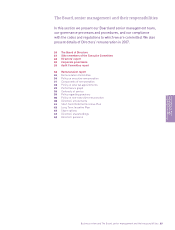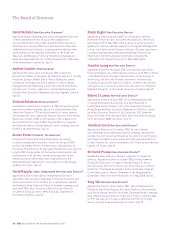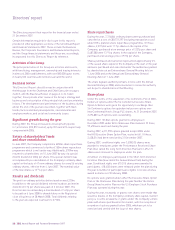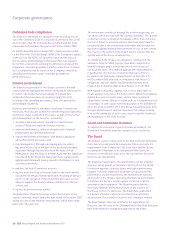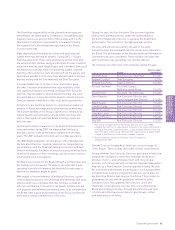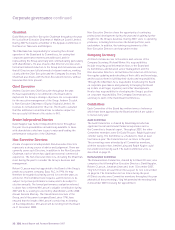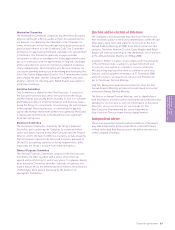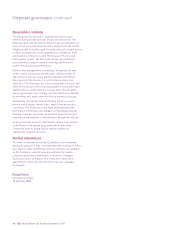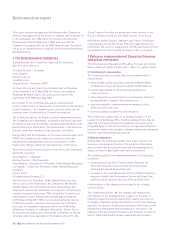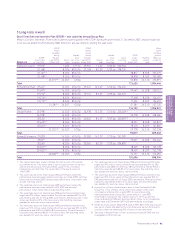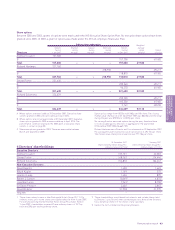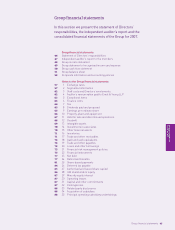Holiday Inn 2007 Annual Report Download - page 37
Download and view the complete annual report
Please find page 37 of the 2007 Holiday Inn annual report below. You can navigate through the pages in the report by either clicking on the pages listed below, or by using the keyword search tool below to find specific information within the annual report.
THE BOARD, SENIOR
MANAGEMENT AND
THEIR RESPONSIBILITIES
Corporate governance and Audit Committee report 35
THE BOARD, SENIOR
MANAGEMENT AND
THEIR RESPONSIBILITIES
Audit Committee report
The Audit Committee assists the Board in meeting its
responsibilities in relation to the integrity of the Group’s financial
statements and associated announcements, the adequacy
of internal control and risk management systems and the
appointment and work of the internal and external auditors.
The role of the Audit Committee is summarised below and in
full in its terms of reference, a copy of which is available on
the Company’s website or in writing on request.
The Committee’s composition, and the attendance of its members,
all of whom served throughout 2007, are set out on page 32.
The Committee’s Chairman and financial expert, David Kappler,
is a chartered management accountant and until April 2004 was
Chief Financial Officer of Cadbury Schweppes plc. He also chairs
the Audit Committee of another UK FTSE 100 company.
The Committee’s principal responsibilities are to:
• review the Group’s public statements on internal control and
corporate governance compliance prior to their consideration
by the Board;
• review the Group’s processes for detecting and addressing
fraud, misconduct and control weaknesses and to consider
the response to any such occurrence, including overseeing
the process enabling the anonymous submission of concerns;
• review reports from management, internal audit and external
audit concerning the effectiveness of internal control, financial
reporting and risk management processes;
• review with management and the external auditor any financial
statements required under UK or US legislation before
submission to the Board;
• establish, review and maintain the role and effectiveness
of the internal audit function, including overseeing the
appointment of the Head of Internal Audit;
• assume responsibility for the appointment, compensation,
resignation, dismissal and the overseeing of the external auditor,
including review of the external audit, its cost and effectiveness;
• pre-approve non-audit work to be carried out by the external
auditor, and the fees to be paid for that work, along with the
monitoring of the external auditor’s independence; and
• oversee the Group’s Code of Ethics and Business Conduct
and associated procedures for monitoring adherence.
The Committee discharges its responsibilities through a series of
Audit Committee meetings during the year, at which detailed reports
are presented for review. The Committee commissions reports,
either from external advisers, the Head of Internal Audit, or Group
management, after consideration of the major risks to the Group
or in response to developing issues. The external auditor attends
its meetings as does the Head of Internal Audit, both of whom
have the opportunity to meet privately with the Committee, in the
absence of Group management, at the conclusion of each meeting.
All proposals for the provision of non-audit services by the
external auditor are pre-approved by the Audit Committee or its
delegated member, the overriding consideration being to ensure
that the provision of non-audit services does not impact the
external auditor’s independence and objectivity.
During the year, the Committee’s deliberations included the
following matters:
• quarterly, interim and full-year financial results. These
public financial statements are reviewed by the Committee
in advance of their consideration by the Board. Adequate time
is allowed between the Committee’s review and the Board’s
approval for any actions or further work requested by the
Committee to be completed;
• the scope and cost of the external audit;
• any non-audit work carried out by the Group’s external auditor
(and trends in the non-audit fees) in accordance with the
Committee’s policy to ensure the safeguarding of audit
independence and objectivity;
• the external auditor’s quarterly, interim and full-year reports;
• the effectiveness of the external auditor and consideration
of their objectivity, independence and reappointment;
• the scope of the annual internal audit plan, the internal audit
department’s approach to delivering assurance, its resourcing
and the results of its reviews;
• the effectiveness of the internal audit function and its
compliance with professional standards;
• any major changes in the Group’s internal controls;
• the co-ordination of the internal and external audit functions;
• the Group’s framework for the identification and control of
major risks, and the results of the Group’s risk review process;
• corporate governance developments in the UK and the US;
• reports from the Head of Group Risk Management on the
activities of that function;
• consideration of the results of the Group’s tangible asset
impairment review;
• overseeing the Group’s Sarbanes-Oxley Act compliance work;
• the disclosure controls and procedures operated by the Group,
with reference to periodic reports from the Chairman of the
Disclosure Committee;
• reviewing the Group’s approach to managing tax risk;
• consideration of the Group’s treasury objectives and policies;
• a review of changes to the Group’s policy on delegation
of authority;
• a review of the funding position and governance of the
Group’s main pension plan;
• periodic reports on any significant incidents of fraud or any
allegations made via the Group’s whistleblowing procedures
and the effectiveness of these procedures;
• any material litigation involving the Group; and
• consideration of the effectiveness of the Audit Committee
and the continuing appropriateness of its terms of reference.
David Kappler
Chairman of the Audit Committee
18 February 2008


